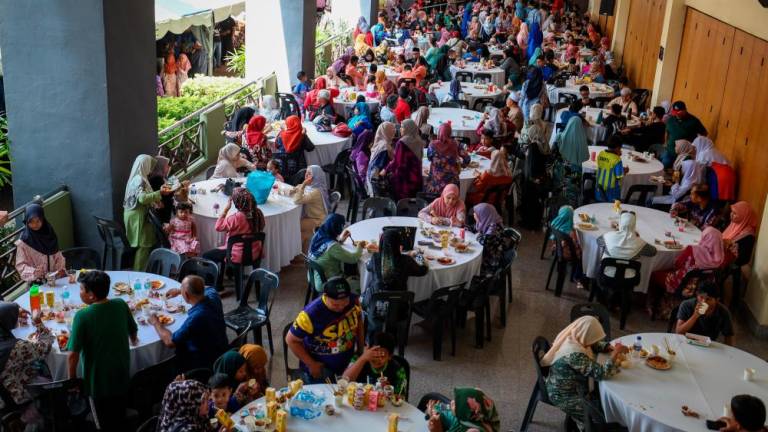Real Estate and Housing Developers’ Association Malaysia (Rehda) president Datuk Soam Heng Choon
Rehda is appreciative that the government has taken into account our proposal to abolish the Real Property Gains Tax (RPGT) for houses intended to be disposed of from the sixth year onwards by Malaysians and permanent residents in the country.
Initially, the RPGT was introduced to curb speculation when the property market was buoyant. However, under the current soft market conditions, we welcome the move. We hope this measure will help invigorate the property market to make it more resilient and eventually translate into a positive multiplier effect on the economy.
Additionally, the further allocation of RM1.5 billion to continue with housing programmes such as the development of Rumah Mesra Rakyat and maintenance of the public housing units is a step in the right direction. Similarly, the RM2 billion guarantees given to banks through the Guaranteed Credit Housing Scheme to assist those in the gig economy and the likes with the ability to pay without income statements is another welcome move. Hopefully, it will encourage more people from this demographic segment to purchase houses as they now have easier access to home financing.
Malaysian Institute of Estate Agents
The proposed budget did not “meet the eye” to provide the stimulus for the revitalising of the property market but left much to its own. As real estate agents, we did not envisage this as it did not meet our expectations of stabilising the real estate sector especially in the secondary market in a challenging market. While we realise the budget detailed the need to take care of the rakyat especially those in the B40 segment, those in the M40 has been somewhat left out.
The introduction of the Housing Loan Guarantee Scheme to help people with no fixed income and no proof of income to own a home, especially gig workers, small business owners, and farmers, on the difficulties of getting housing loans is a laudable move as financing has always been a struggle for this group.
The issue of home ownership is a universal principal and in this respect some assistance and support should have been given to the M40 group who have been left out. The M40 is an important sector that caters for the mid segment of the property market and they play a critical role in the new properties and the secondary market. Not all property owners are “strong financially”.
The moratorium and Home Ownership Campaign (HOC) will end this year, leaving a big vacuum for property owners/buyers. With the loan moratorium ending, this will have a significant effect as majority of the rakyat need to have a stable income to keep up with loan commitments and most businesses have not returned to normal as hoped. In fact, with insufficient support, we fear a systemic shock. Perhaps loan moratorium or interest-only loan payments which need not be presented in the country’s budget be given serious consideration.
On the increasing numbers of abandoned projects, some measures need to be introduced to help the buyers who are in a predicament of having to pay rent where they are and also to service interest on their “dream home” which now its time to complete is in limbo.
There are two sides to the HOC programme, where some are of the opinion that it benefits developers to sell their projects; while others appreciate the discounts and savings to finally own a home under the programme. To care for the first time home buyers, perhaps the HOC can continue with a lowering of the price threshold from RM2.5 million to RM1.5 million so that the first time home buyers can still get into the market in 2022.
We are appreciative of the extension of the removal of RPGT after six years. When this was first introduced early 2021, there was positive movement in the secondary market transactions. Presently it is limited to three residential properties within the year. We await more clarity on this extension. This should be coupled with a stimulus for purchase to form a formidable impact on the property market.
The reintroduction of the tax incentive for commercial property owners who offer 30% discount on rents will assist existing tenancies to keep running and the businesses currently in operation to enjoy some relief on the monthly cash flow as rents and manpower are the two largest cost in an SME business.
The extension of the up to RM300,000 tax incentive for renovations of commercial properties is notable to cater to the requirements of safe office environment.
SP Setia Bhd president & CEO Datuk Choong Kai Wai
Budget 2022’s focus on green budgeting is apt and timely to propel the government’s agenda on sustainability aligned to the 17 Sustainable Development Goals (SGDs). Setia is committed to its sustainability journey as its vision is to become an ever more sustainable digital player in the long term.
We appreciate the government’s initiative to provide a guarantee of up to RM2 billion to banks under the Housing Credit Guarantee Scheme to help those who can repay the mortgage loan but have no proof of fixed income to get approval for said loans. This will help those who are in this predicament to purchase own homes.
Although six years holding is relatively long, we hope the removal of the RPGT for property sales after the sixth year will help to spur the sub-sale market by increasing property transactions and will indirectly help invigorate the supply chain and rejuvenate the property industry.
The RM1.5 billion allocated to the continuation of current housing programmes for low-income earners is welcomed as it continues to help eligible low-income earners own their dream homes. The government must continue to prioritise homeownership as a key national policy as it will also help boost the property market.
We had hoped the government would consider reducing individual income tax rates, especially for those who are affected by the MCO which was not tabled. However, we are heartened to see one-off exemptions provided to help those in need.
Mah Sing Group Bhd founder and group managing director Tan Sri Leong Hoy Kum
The property market will benefit from the newly announced measures such as the allocation of RM2 billion guarantee through the Housing Credit Guarantee Scheme to facilitate loans for those without proof of steady income as well as the RPGT waiver for property disposed from the sixth year and above.
This would be a timely catalyst in expediting the recovery of the property industry in line with the general consensus of expecting 2022 to be a better year for Malaysia.
The government’s provision of RM2 billion guarantee through the Housing Credit Guarantee Scheme will definitely help those without steady income, including the gig economy workers, small entrepreneurs and farmers to have easier access to housing loans and embark on their own homeownership journey.
The RPGT waiver for property disposed from sixth year and above is expected to stimulate more interest in the secondary market. This would also boost the overall property market’s sentiment as buyers could look to upgrade their homes after selling their older units.
PropertyGuru Malaysia country manager Sheldon Fernandez
We welcome the RM1.5 billion allocation to continue low-cost housing projects and the additional RM2 billion allocation to enable those without a stable income to own a home through the Housing Credit Guarantee Scheme under the Pemilikan Rumah Kediaman initiative.
According to our recent Consumer Sentiment Study, 46% of Malaysians surveyed shared that they face difficulties in securing home loans, with the top two barriers being the inability to afford down payment and unstable job or salary. Hence, these two measures will bring relief to the woes of many Malaysians, alleviate the struggles of potential homebuyers in the country, as well as further encourage homeownership in a systematic and inclusive manner as we believe that all Malaysians have the right to own their dream home.
In addition, the government’s move to abolish the RPGT on properties that are disposed from the sixth year onwards is laudable, as we believe this would not only help to decrease the burden of non-speculative property holders, it will also help to stimulate the property market by encouraging the buying and selling of residential properties.
We believe more can be done to help revitalise the property sector, especially as the nation is still at the beginning stages of its journey to recovery. As outlined in our wish list, we hope that the government would extend the Home Ownership Campaign to 2022 and that the incentives under the campaign can be extended to the secondary residential market to help spur the economy and encourage first-time homebuyers to consider buying sub-sale properties. This was also a measure that 58% of Malaysians wished for from the government, according to our Consumer Sentiment Study.
LBS Bina Group Bhd executive chairman Tan Sri Lim Hock San
LBS welcomes the government’s removal of RPGT on properties sold after six years from when it was first acquired. LBS believes this is an important move to stimulate the secondary property market and encourage long-term investment. The public would be more receptive towards home upgrades and owning a property.
LBS appreciates that the government has placed the lower-income households at the forefront of Budget 2022 by providing RM2 billion in guarantees under the Housing Credit Guarantee Scheme for those without a steady income. This improves the accessibility of gig-workers, small-time business owners and farmers towards obtaining housing loans and owning their own home, which LBS strives to provide.
The extension of personal income tax relief of up to RM1,000 for domestic tourism expenses up to the year of assessment 2022 is beneficial to encourage tourism within Malaysia. This is in particular since LBS has earlier this year re-opened to tourists its own Scapes Hotel in Genting Highlands. The effective re-opening of the tourism sector translates to a positive multiplier effect for the economy.
The initiatives under Budget 2022 appear balanced with the aim of assisting businesses and the rakyat towards economic recovery post-pandemic. The government has not introduced any additional taxes to burden families, which bode well for LBS as there is a greater opportunity for more funds to be channelled towards the property development sector. Overall, we laud the government’s efforts in proposing a budget that is strong and proactive as we continue to work towards reviving the property market.
Juwai IQI co-founder and group CEO Kashif Ansari
In Budget 2022, the government has focused on building more affordable housing and has also introduced measures to assist those without a stable income in purchasing a home. Malaysia has a young and rapidly growing urban population that desires the security of owning their own home. The pandemic has increased the demand for home ownership. We are pleased that the government is making it easier for Malaysians of all income levels to purchase a home. Real estate is a major source of wealth creation and financial security for Malaysian families.
Another welcome change is the elimination of the RPGT on Malaysians, permanent residents, and corporations who sell real estate assets after the sixth year. This move will help revitalise the Malaysian property market, resulting in a positive multiplier effect on the economy.
The budget’s most significant impact on property will come from the resulting economic growth. More rapid economic growth and job creation will increase household savings and demand for housing.
We expect to see more first-time homebuyers making purchases under this budget. The government is allocating RM1.5 billion for the construction of more low-cost housing and RM2 billion for housing credit. The budget will directly enable more first-time buyers to own a home. Obtaining loan approval, particularly for those without a steady income, has always been a barrier to home ownership. This is an excellent budget for first-time homebuyers and those who do not have a steady source of income.
Higher homeownership rates will result in greater wealth and financial security for young families in the coming decade. Homeownership is the ticket to greater wealth for families with relatively few other assets. It allows everyone to benefit from our country’s economic growth and climbing home prices.
The pandemic has clearly had a profound impact on the country. Measures like the RM8.2 billion Bantuan Keluarga Malaysia, multiple initiatives to improve education, training, and upskilling, and acknowledging the role of women through various targeted development measures are critical to ensuring a rapid resumption of economic activities and avoiding a longer economic downturn.
Juwai IQI is also committed to creating over 1,000 technology job opportunities in Malaysia and researching and developing solutions around real estate, proptech and the metaverse, a move that has been warmly welcomed by the Malaysia Digital Economy Corp and is in line with the government’s MyDigital initiative.
Speedhome CEO Wong Whei Meng
Although the government has abolished the RPGT for properties in the sixth year of ownership and provided RM2 bIllion for the gig workers or unstable income group, it can’t change the low house-buying sentiment of the domestic property market.
Many external factors will still affect real estate in the next six months. This includes possible increases in loan interest rates due to inflation, the rising cost of construction materials, and a downturn in the job market.
Although the government has decided to provide an RM2 billion loan guarantee for people with unstable incomes, uncertain economic prospects and insufficient housing incentives, more people will also cancel or extend their
housing purchase plans and continue to choose to rent houses.
As the country enters the recovery stage, Speedhome’s rental demand in the Klang Valley has continued to increase for two consecutive months. In addition, there are signs of returning students and workers from other states, which will contribute to the increase in demand for rental housing.
Covid-19 has badly impacted homeowners as they face higher housing vacancy rates and problematic tenants. Yet, the government policies rarely protect their interests, not to mention there is almost no rebate on the rental tax next year. As a result, they suffer from loss of rental and other major losses. This has caused more landlords to be more stringent in renting or choosing their next potential tenant, broadening the conflict between tenants and homeowners.
On the other hand, as conserving cash flow is crucial in a recovering economy, the traditional 2+1 deposits are burdening tenants. Hence, in addition to providing housing loan guarantees for the gig economy workers, the government must also strengthen the housing rental power of young people.
We should not only encourage young people to buy houses, but the government must also think about how to make renting more affordable for newly employed young working adults. The high upfront rental deposit makes it difficult for the majority of young people to find a house. Thus why making renting more affordable is a small yet impactful step to empower youth relocating to the city.
The Property Agents and Practitioners Association (Papa)
Papa welcomes the measures provided for in the Budget 2022 to help the real estate sector.
The removal of RPGT from the sixth year onwards is a much needed relief as those who sell their properties from the sixth year onwards are not necessarily speculators but mostly those who needed money to pay debts, medical fees or children’s education.
The allocation of RM2 billion under housing credit guarantee scheme to assist those without steady income, such as gig economy workers, to purchase homes is much needed to encourage first time home buyers who are from the lower income group.
Building and commercial unit owners would definitely benefit from the special tax exemption given for a rental discount of 30% or more. The Covid-19 pandemic has somewhat alter the usage and demand for commercial space with a significant shift towards working from home thus lessening the need for all the staff to work in office
The RM700 million allocated to enhance digital connectivity in 47 industrial areas and 630 schools, especially those in rural areas is also timely since there is a demand for warehouse space due to the surge in e commerce activities.













